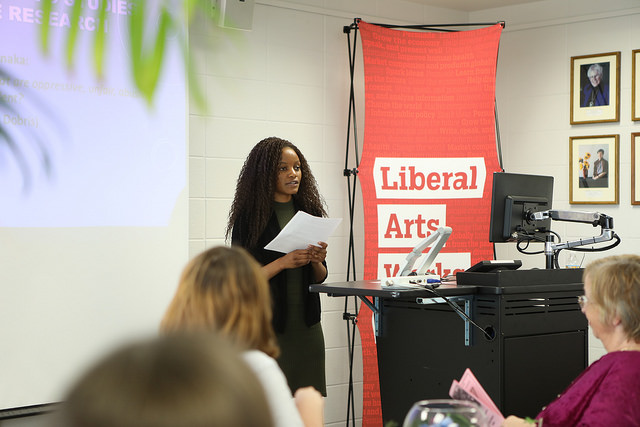
Taking a minor in WGSS provides you with skills and insights that add to any other major, giving you an understanding of the issues around marginalized groups and the solutions to help empower them. If you want to continue professional or graduate work, WGSS gives you the interdisciplinary lens that broadens options for research and study.
A minor in WGSS requires satisfactory completion of the following:
“The Women’s Studies minor was great because it provided both breadth and depth: I took classes in history, journalism, Spanish, and even a special topics course on the Salem Witch Trials. I also completed an independent study that explored the history, current state and future outlook for women in sports journalism, which involved talking to current professionals about their challenges and how the environment had changed, as well as how it hadn’t. What’s great about the WGSS program is that it’s so customizable and affords you the opportunity to explore an aspect of your major field, whatever that may be, through a focused, yet interdisciplinary lens. My advice to undergraduate students, whether you are majoring or minoring in WGSS or considering doing so, would be to push yourself outside your comfort zone and take an eclectic mix of courses you’d never predict you’d be interested in — getting absolutely sucked into a course is more rewarding when you never see it coming.”
Sarah majored in English (Writing and Literacy), Journalism, and Spanish. She minored in English Literature and Women’s Studies. She is a regular freelance writer for the New York Times, mainly for the Culture desk, and occasionally for the Style, National, and Business desks.
— Sarah Bahr BA ‘18
The capstone project for the WGSS minor is a one-credit, directed study that serves as a culmination for your research interests in Women’s, Gender, and Sexuality Studies. Typically, at least one semester in advance of graduating, you must confer with the Director of the WGSS Program to determine a course of action.
Most of you may wish to work on research conducted previously in that instructor’s course. If you are unable to find a suitable arrangement with a previous instructor, Dr Catherine Dobris will assist you. The capstone will ordinarily be directed by a full-time faculty member.
The purpose of the capstone is to provide an enriching experience for you which will help to focus and crystallize thinking and research in the minor. Toward that end, there are variations in the above description that will be considered if they appear to meet the general aim of the activity. All proposals for variation should be submitted to the program director in writing.
Consult your degree map for a snapshot of classes, you will be taking to finish your degree to completion. If you have any questions, please contact Liberal Arts Academic Advising, laadvise@iu.edu.